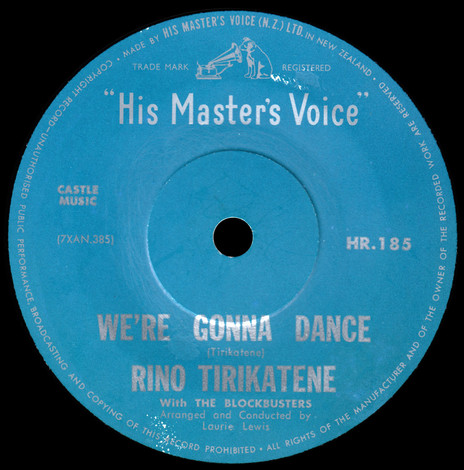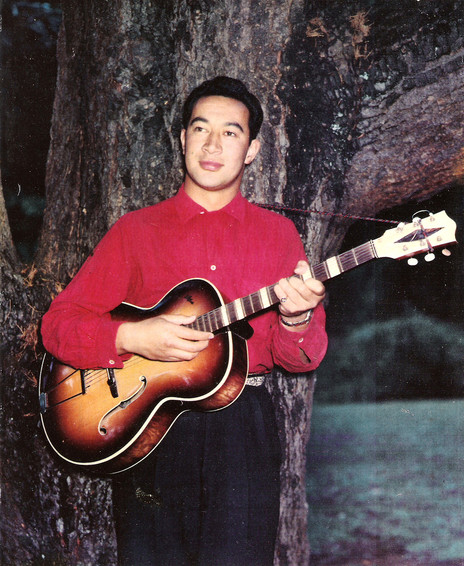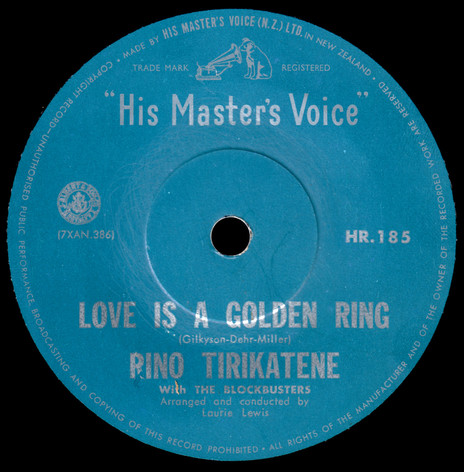But it was as a singer that Tirikatene won a nationwide Māori talent contest in 1961. He came to the attention of legendary teacher Sister Mary Leo, who offered him vocal training. But Tirikatene turned her offer down, as he wanted to concentrate on the more “pop” stylings of the day. This paid off when he was signed to HMV Records in 1962.
Tirikatene turned down Sister Mary Leo’s offer of vocal training – he preferred to sing pop.
For his debut single in 1963, Tirikatene was teamed up with HMV studio band The Blockbusters, with Wellington jazz saxophonist and pop producer Laurie Lewis arranging and conducting. ‘We’re Gonna Dance’ – a song written by Tirikatene – was released as the A-side, at a time when only a fraction of local releases were written by the recording artist. On the flip side was ‘Love is a Golden Ring’, a 1957 hit for Frankie Laine.
‘We’re Gonna Dance’ was followed up with ‘The Sinner’ b/w ‘Butterfly’. If his first two singles were encouraging debuts, then both sides of his third single – ‘The Searching Is Over’ b/w ‘Times Are Tough’ – show a vocal richness and production standards that were rare among local artists. He really knew how to use his diaphragm, and could float effortlessly from basso profundo to almost falsetto. ‘Times Are Tough’ recalls the delivery of Lou Rawls, or a swinging Paul Robeson. ‘The Searching Is Over’ suggests Bobby Bland, with Tirikatene’s big voice taking a detour from the melody for an occasional growling or spoken aside.
The original version of ‘The Searching Is Over’ was recorded by Tirikatene’s contemporary, US singer Joe Henderson (originally a gospel singer, not the Verve jazz artist). By comparison, Tirikatene’s powerhouse performance makes Henderson sound like a child singer.
With recording due to start on an album in 1964, Tirikatene decided to instead become a minister in the Rātana Church; at the same time, his sister Whetu Tirikatene-Sullivan began her long political career. The only work undertaken for the album was a photo shoot that produced the image intended for the front cover. Tirikatene remained an enthusiastic social singer for the rest of his life, and he often sang at fundraising concerts for Māori causes. Although the country missed out on sharing his remarkable voice, the people from his community and church benefited from his tireless work.
With his family background, it was almost inescapable that Tirikatene was involved in politics. In 1963 he was the first Māori candidate to stand for Labour in a general seat. Rangiora was a blue-ribbon National electorate, and inevitably he missed out that year and in 1966. He was chosen as the Labour candidate for Sydenham in 1969, but was asked by Labour leader Norman Kirk to step aside so that the future prime minister could stand in a safe seat. Tirikatene later tried to be nominated as the Labour candidate for Porirua, but missed out to Dr Gerard Wall.
Tirikatene remained a stalwart of the Labour party throughout his life. He was on its Māori policy council for 30 years, and the chairman of the Labour electorate committee for his sister’s Southern Māori seat for 25 years.
THE YEAR his single ‘The Sinner’ was released he was ordained as a minister in the Rātana Church.
Outside of politics, Tirikatene was active as a minister, teacher, personnel manager and Justice of the Peace. In 1963 – the year his single ‘The Sinner’ was released – he was ordained as a minister in the Rātana Church. He spent years as a chaplain visiting prisons and hospitals, and helped resolve industrial disputes. He was awarded the QSM in 1987.
In 1995 he stood for Parliament again, in the new Māori seat of Te Puku o Te Whenua (the bottom half of the North Island, excluding Wellington, Horowhenua and part of the Manawatu), and was widely expected to win. However he died suddenly during the election campaign, aged 54.
His Evening Post obituary by John King records that Labour leader Helen Clark said Tirikatene had led a full life working for the party, the Rātana movement and charity. “He will be greatly missed by all those who have had the privilege of working alongside him.” (His son, also called Rino Tirikatene, became the Labour MP for Te Tai Tonga in 2011.)
Fifty years after his three HMV singles, Rino Tirikatene is virtually a forgotten footnote in New Zealand popular music history. His singles have been uploaded to YouTube, and ‘The Searching Is Over’ and ‘Times Are Tough’ were included on the compilation CDs of Māori pop, Waiata and Waiata 2. These are the only available musical tributes to a man who could have become a major talent on the world stage – but instead chose to help his fellow man.


